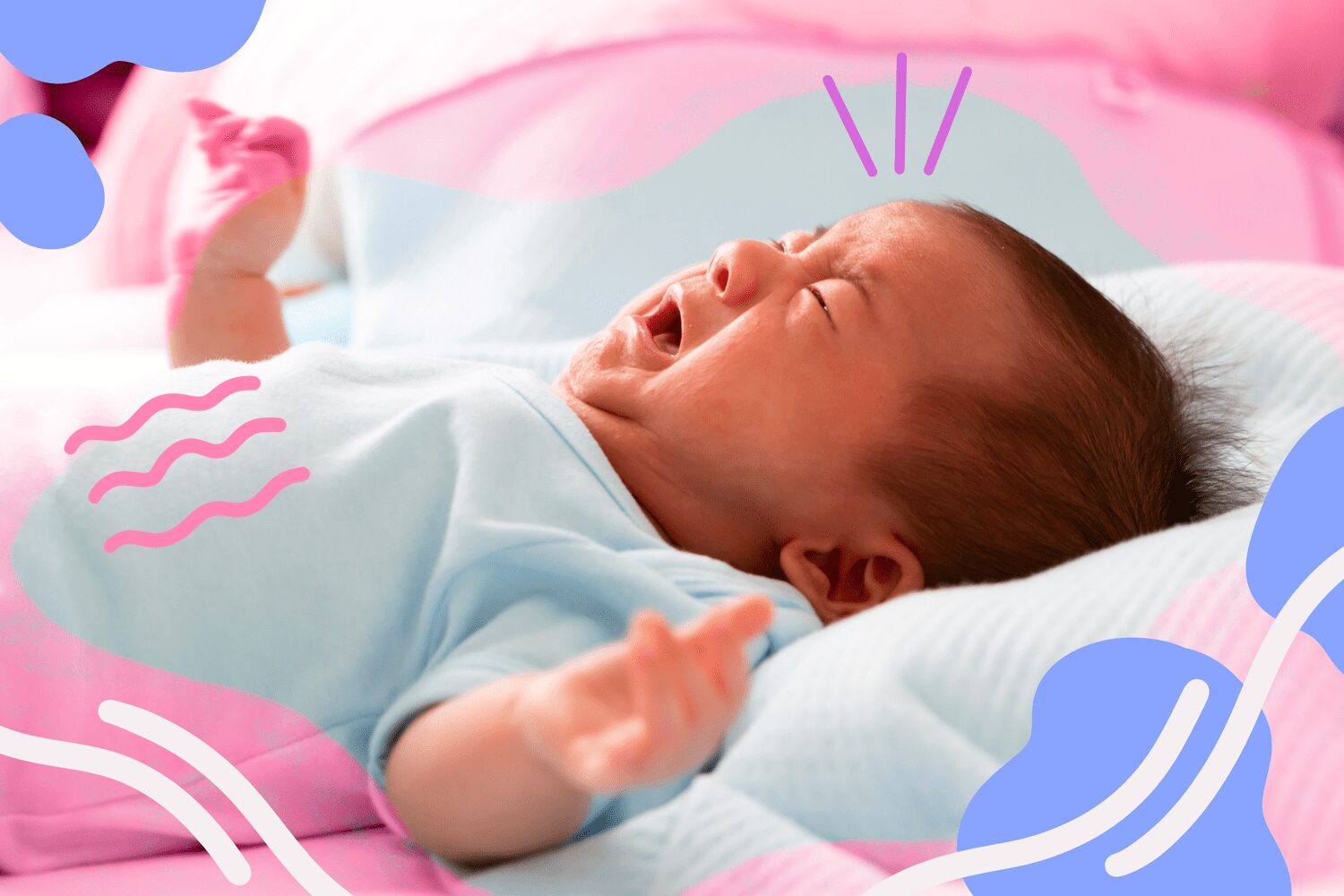5 Common Reasons Your Baby Won’t Stop Crying

In general, crying is normal for any baby. The little guys can’t talk yet and have no other way of communicating and expressing their needs. So, by crying, they let you know what they want – parents with experience can even tell the exact reason for their baby’s crying by the sound and facial expressions.
Although, if crying doesn’t stop for hours, it might indicate that something’s wrong, for example, that your infant is ill. With time, you will get perfectly tuned with your little one and understand his/her crying. To give you a jump start, we’ve gathered the 5 most common reasons your baby won’t stop crying.
#1 Stomach Issues (Colic, Acid Reflux, Food Allergy)

Sensitive tummies are a very common problem for infants. At least one of such problems as colic, acid reflux, food allergy, constipation, or diarrhea happen to almost all babies younger than 4 months. Luckily, babies outgrow a lot of stomach issues. Their digestive systems get used to drinking milk and then eating solid foods, and the digestive processes normalize.
The most common symptoms of colic are a flushed face, crying, clenching fists, drawing up the legs, etc. For acid reflux, these are vomiting, spitting milk, and losing weight. Food allergies are characterized by rashes, diarrhea, vomiting, and similar symptoms.
Of course, if your baby shows the mentioned symptoms, consult with a pediatrician as soon as possible to determine the exact reason. Don’t try to diagnose your infant’s health issues by yourself – it can be dangerous for his/her health.
Various baby stomach issues can be fixed by changing the ration. For example, a pediatrician might advise you to try a special infant formula created for a certain tummy problem. Thankfully, there is a wide variety of options on the market these days.
#2 Gassy Baby
Another very common reason for an infant crying is gas building up in his/her stomach. The symptoms of a “gassy baby” are intense crying, irritability, and your little one appears to be in pain and is very squirmy. A baby’s digestive system isn’t fully developed yet, which causes gas problems. Besides, infants often swallow excessive air when crying and drinking milk.
But another reason for gas might be the wrong diet – sometimes, it’s enough to switch to another formula milk or choose a special formula to relieve your precious one’s pain. There are also different methods of getting rid of gasses, and a doctor will show you how to do it safely and without any medications.
#3 Overstimulation From Activity or Noise

All the fuss of this world is new to a baby and can be overstimulating for a delicate infant’s nervous system. Too much excitement and impressions, too loud noises, too bright light can be bad for your little one’s peace of mind, which might cause non-stop crying.
To avoid such a situation, pay attention to your infant’s surroundings – don’t take him/her to places with loud music, shouting, sharp sounds, too bright light, and so on.
Sometimes, even your friends’ or relatives’ visits can become an overstimulation for your infant. If he/she won’t stop crying and you don’t know what to do because you’ve already tried everything to calm the little one down, there is one good tip.
Leave your baby alone in his/her bed for a few minutes, turn down the light to a minimum, and leave the room. Your baby might calm down on its own.
#4 Baby Diet Issues
If you’re breastfeeding your baby and he/she starts to show signs of an allergy or a sensitive tummy, consult with a doctor to find out whether the food you’re eating is the problem. Allergens and microelements transfer to a baby’s digestive system with milk, so your own ration is extremely important and needs to be thought out.
Children who are bottle-fed with baby formula also can show signs of formula not agreeing with their body. The main signs of infant formula intolerance are frequent crying, especially after feedings, acid reflux, diarrhea or severe constipation, rash or other allergy symptoms, mucus or blood in stool, and noticeable weight loss or gain.
A situation when baby formula doesn’t agree with a baby’s digestive system happens sometimes, it doesn’t mean that your infant can’t have formula milk. Just this particular brand or baby food composition isn’t suitable for your little champ.
To solve the problem, you only have to switch to another product or manufacturer. Check Holle cow infant formula (Stage Pre) or Hipp combiotic formula, or Jovie goat milk formula, or one of the dozens of different high-quality baby food products of European and American manufacturers.
#5 Pain or Illness

When a baby starts crying, the first thing any mother does is hold her little one, lull him/her, feed the baby, and check the diaper.
But in some cases, none of it helps and your infant just won’t stop crying. If you know that your baby is fed, well-rested, and bathed, the temperature in the room is fine, there are no outside factors that might irritate the baby (like loud noises or bright light), no strangers nearby, and everything seems comfy for the little guy but he/she continues to cry for hours, it means that there is a chance of your infant being ill or in pain.
You should consult a pediatrician and make sure your baby’s health is ok. Don’t ignore excessive crying. Sure, it’s a normal thing for an infant to cry – they communicate with adults this way – but still, non-stop crying might be a red flag for parents that something is not right.
However, some babies simply have a testy temperament. So, it’s important for parents to pay attention to their baby’s reactions and traits of character. This typically happens naturally – the more time you spend with your little one, the better you know his/her personality.
Bottom line
There are many various reasons for babies to cry. They communicate with other people and express their emotions by crying.
But also, this is the only way for infants to tell the parents that something’s wrong and the baby doesn’t feel fine, so pay attention to excessive crying – in case there are any health issues, your kid’s pediatrician will help you fix them, but the sooner you go to a doctor, the better. Anyway, we are sure you’re taking good care of your little one and wish your baby to be healthy and happy.




